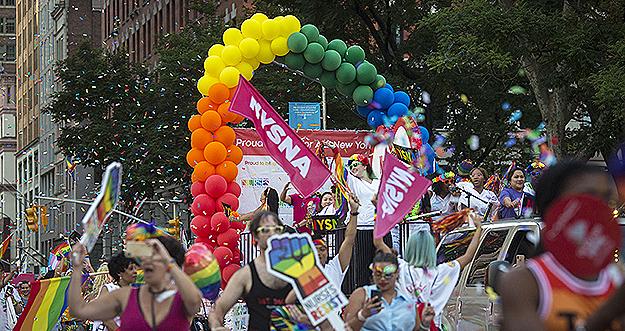Beyond Pride: How Nurses Can Be Allies for the LGBTQIA+ Community All Year Long

The events of the last two-and-a-half years have sparked a much-needed fire in the United States. In the wake of the murders of George Floyd, Breonna Taylor and many other Black and indigenous people of color, as well as the COVID-19 pandemic and the resulting displays of anti-Asian hate, the dark underbelly of the United States has been undeniably exposed: systemic racism and prejudice. Of course, the prejudice not only extends to racial and ethnic minorities but also to the LGBTQIA+ community, the unhoused and persons of lower socioeconomic status.
In the wake of these recent atrocities, a movement of anti-racism and decolonization is building. The call to respond is not limited to individuals but is also presented to institutions, governments and professions. The healthcare professions are not exempt from this call. It is deeply important that healthcare professionals have a respect for persons of all races and ethnicities, gender, religion, immigration status and sexual orientation/gender identity.
Healthcare Disparities
The LGBTQIA+ community faces a lot of challenges, not the least of which is healthcare disparities and discrimination in the healthcare setting. Disparities include access to gender-affirming care for transgender individuals, access to mental health services, access to preventative sexual health services (such as sexually transmitted infections testing and prophylaxis, Pap smears for lesbian and bisexual women, screenings for rectal cancer for gay and bisexual men), and HIV care for HIV positive patients. LGBTQIA+ couples or singles who want to become parents may face additional challenges based on the state in which they live and how LGBTQIA+-friendly that state is, because they will need access to fertility centers, sperm donation/artificial insemination for lesbian couples and surrogacy for gay couples. In states that are currently trying to revoke rights for LGBTQIA+ patients, the dream of building a family could be crushed. LGBTQIA+ teens are at higher risk for bullying, homelessness, parental rejection, mental health issues and suicidal thoughts/intentions.
Advocating for LGBTQIA+ Patients
So, where do nurses fit in? How can nurses advocate for LGBTQIA+ patients? First, educate yourself. While the health issues that LGBTQIA+ people face are very important, they are often not explored in depth in undergraduate nursing education. One study found that, especially in rural areas, healthcare providers admitted that they had really no education about appropriate care or the LGBTQIA+ patient (Shaver & Stephenson, 2019). Assess your knowledge level regarding the LGBTQIA+ population’s health needs, but realize that there are subpopulations within that group and that each subpopulation has different needs. Your approach to treatment cannot be a one-size-fits-all approach. As with all patients, keep your care patient-centered and patient-specific.
Second, assess your own internal bias. Examine yourself honestly and work that out, because it has no place in healthcare. Healthcare providers are to do no harm and are to provide care to all patients, regardless of race, age, sex, sexual orientation or gender identity. Discrimination causes mistrust in healthcare providers. “Discrimination by health care professionals and a lack of providers with knowledge about transgender health is a major deterrent for transgender persons to access healthcare. Education is likely to be foundational in teaching cultural competence and dispelling sexual stigma” (Dutton, et al, 2022). If you see a fellow hospital employee discriminating against a LGBTQIA+ patient (or coworker), speak up. Do something about it.
Third, get personal. Ask your patients their preferred pronouns. Offer yours. Wear a rainbow pin on your badge reel. It may seem small, but it is an outward, visible sign that you are an ally, and it can make a huge difference to an anxious patient. Speak with your unit manager about putting up posters around your unit regarding it being a welcoming place for LGBTQIA+ patients.
Get Involved
Finally, get involved. Advocate in your unit, in your hospital, and at the state and national government level for LGBTQIA+ rights. We need allies more than ever, and the more voices that are heard, the better. LGBTQIA+ rights are human rights. Yes, we’re proud. But we’re also fighting a battle for our lives and rights. As a nurse, I know that nurses are the best advocates anyone could ask for — so I am asking you, please be an advocate for your LGBTQIA+ patients.
And to my fellow LGBTQIA+ nurses, happy PRIDE!